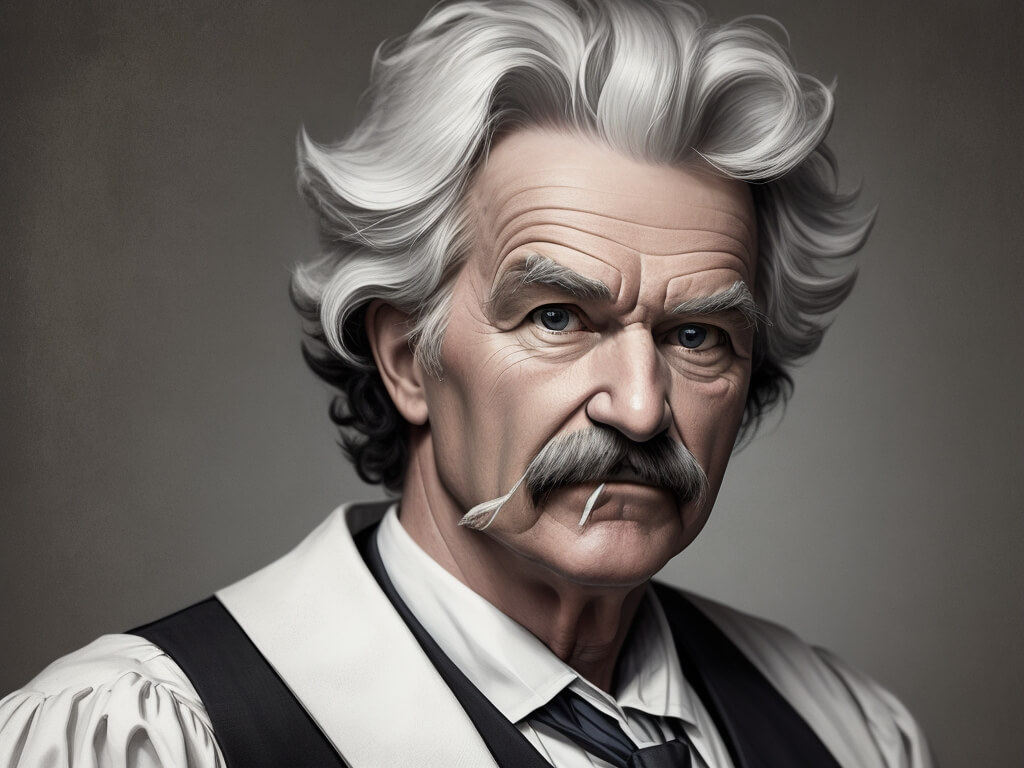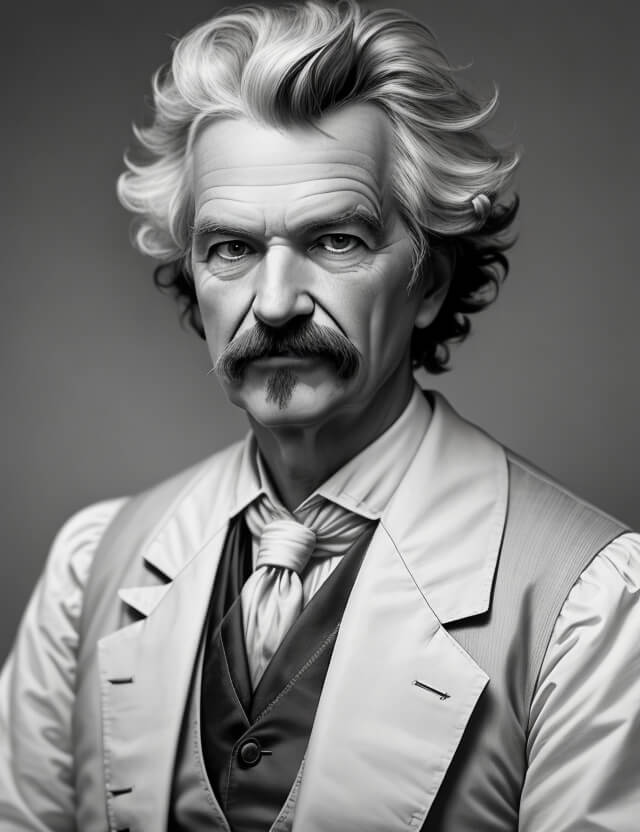What did Mark Twain do? Information about Mark Twain achievements, works, art, books and career.

Mark Twain Achievements;
In his own time, Mark Twain was popular in the marketplace but was treated patronizingly by the literary world. Even his ardent friend and admirer William Dean Howells betrays a note of special pleading in praising him. Some members of the generation that followed Twain recognized his genius but thought he needed to be rehabilitated as a dark and embittered satirist. Other members of that generation subscribed to Van Wyck Brooks’ view that “Mark Twain” was a betrayal of the true genius of Samuel Clemens and that the despair of Twain’s late years was in fact an embittered recognition of that betrayal. In the 1930’s the democratic liberalism of Mark
Twain came into focus. Bernard De Voto denounced Brooks’ psychological thesis and replaced it with a historical and sociological one, contending that Mark Twain, a true son of the frontier, had brought a robust and democratic energy into the effete literature of the East.
Later, Twain’s prominence as a “writer’s writer” was emphasized. The sign if not the cause of this shift in judgment was Ernest Hemingway’s famous observation in The Green Hills of Africa (1935) that Huckleberry Finn is both the first and best book in American literature. Twenty years later, William Faulkner said much the same thing. What both Hemingway and Faulkner meant was that Mark Twain, by being the first American writer to discover an American language, also discovered an American consciousness.
Twain’s Art.
Three of Twain’s attributes made this discovery possible. First, he possessed utter clarity of style. In his long apprenticeship as printer and reporter, he had mastered the English anguage, evolving a style so clear and economical that other contemporary styles seemed slightly archaic, fusty, and redundant. Mastery of language is Mark Twain’s trademark; nowhere is his clarity more visible or effective than in his first long work, The Innocents Abroad.
Second, Mark Twain had a supreme command of vernacular American English. Before him there had been only American dialect; after him there was an American language. American dialect had been used primitively by James Feni-more Cooper, effectively by Harriet Beecher Stowe and James Russell Lowell, and superbly by the Southwestern humorists A. B. Longstreet, T. B. Thorpe, and G. W. Harris. But in the hands of these writers it was surrounded and conditioned by a “literary” language that wittingly or unwittingly patronized it. Mark Twain removed the surrounding frame. It almost disappeared in the Jumping Frog, with only a semblance remaining around Simon Wheeler’s garrulous narrative and wonderfully free digressions. In Huckleberry Finn, it completely disappeared, leaving a remarkably “incorrect” language that implies the missing “correct” language. Freeing the “incorrect” language parallels Huck’s “incorrect” action—the freeing of a slave in the old South—and has the same kind of importance in the book.
Finally, there was Mark Twain’s humor, which resists explanation. Twain appeared at precisely the moment in history when the transformation of the meaning of the term “humor,” from bodily fluid to quality of mind, was about to be completed. In Twain’s time, humor, though it was seen as gready valuable, remained distinctly subordinate in the value system of the 19th century. The function of humor was to entertain, but it was not expected to participate in the high seriousness that Matthew Arnold and his age asked of literature. A professional humorist was expected either to keep his low place, or, if he wished to rise, to acquire the seriousness that would at once elevate and subdue his humor. Thus Charles Dickens, one of the great humorists of the 19th century, began as “Boz,” but moved away from humor toward melodrama and “serious” narrative.
But Twain liberated humor, raising it to high art—a liberation that parallels his liberation of vernacular American English. Instead of subduing his humor to seriousness, Twain invaded the citadels of seriousness and freed the humor held captive there.

Twain’s career, in fact, was a long process of invasion. During the Civil War, when he was guilty of the capital crimes of treason and desertion, Samuel Clemens “invaded” the Nevada Territory and emerged as Mark Twain, a name that “grew” from being a mere comic pseudonym into a humorous reconstruction of the life of Samuel Clemens. Significantly enough, Twain became nationally famous when he “invaded” Europe as a correspondent with the first organized tour of the Continent. His humorously irreverent perspective, not regional but fully national, belittled both Europe and the American image of Europe that had belittled him. Mark Twain then “invaded” the past. Thus, Roughing It and Old Times on the Mississippi, by humorously reconstructing the life of Samuel Clemens, converted the failures and humiliations of the past into narratives of pure pleasure.
In Tom Sawyer, Mark Twain carried his invasion of the past into the realm of childhood, converting the shame, fear, and self-pity of childhood into triumphant play and make-believe. Also, by permitting Tom to indulge in childhood pleasure, he disclosed the essential adult lie that in life work is really play in masquerade.
In Huckleberry Finn, Twain carried his “invasion” to its limits. By involving a boy of the old South in freeing a slave, he discovered the perfect act for the irony of his humor, for Huck is as morally powerless to avoid the “sin” of helping Jim to freedom as he is to write correct English. He both acts and writes in ways that the reader indulgently approves. Thus, when Huck is finally forced to decide to help Jim, saying “All right, then, I’ll go to Hell,” the reader sends him straight to Heaven. Yet Huck’s active determination to be a “bad boy” makes him a “Tom Sawyer”—a part he is forced to play in the uncomfortable final chapters of the book. It turns out, of course, that Jim was free all along. This is what the reader had counted on from the beginning, and he can therefore “approve” Huck’s action since it was not really “bad.”
Those who do not appreciate this joke at the reader’s expense can take refuge in lamenting Mark Twain’s “failure” as an artist. Those who do, discover that the real villain of the novel is the adult conscience, whether Northern or Southern, that enables civilization to indulge and approve acts of cruelty. This is the civilization to which Huck’s triumphant gesture ironically commits him, but he rejects his stand at the last moment, retreating into childhood and leaving Mark Twain (as well as the reader) to face disillusionment with mankind.
And face it Mark Twain did—clamorously in A Connecticut Yankee, ironically in Pudd’nhead Wilson, and satirically in The Mysterious Stranger. But whatever disillusion Huckleberry Finn led him to, it remained to become an American classic—a genuine novel of reconstruction, which brought not the old but an entirely new South back into the Union, converted the tragic issue of slavery into a remarkable odyssey of humor, and followed the pleasure principle as far as it would lead him toward the discovery that the conscience is at once man’s tyranny and pleasure. That was consciousness enough to match his language.